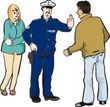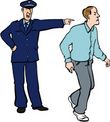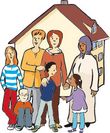Love with respect
- instead of violence!
The police can help you

How do you reach the police?
When you experience violence, you can call the police.
 You can call the emergency number 110.
You can call the emergency number 110.- You can go to the police.
There is always someone at the police station.
Around the clock.
Day and night.
You can press charges there. - You can also send a fax to the 110 number.
 What will the police do?
What will the police do?
When you experience violence, you can call the police.
They will come and help you.
The police will ask you: What exactly happened?
The police will check: Are you in danger?
Is the perpetrator still threatening you?
 Then the police can send the perpetrator from the apartment.
Then the police can send the perpetrator from the apartment.
Or the refugee camp.
He may be banned from returning for up to two weeks.
Until then, he must sleep elsewhere:
- With friends,
- With relatives,
- In a house for homeless people.
- In another refugee camp.
That is for your protection.
Then you have two weeks' time.
You can think in peace:
What do you want to do next?
 The police will explain to you:
The police will explain to you:
- This is what you can do now.
- These are your rights.
- This is where you can get counseling and help.
 The police can also take you to a safe place.
The police can also take you to a safe place.
For instance a women's shelter.
If you want.
And if you would feel safer at the women's shelter.
You can press charges at the police.
Then the police will investigate.
What happened?
Who did it?
Then the police will look for evidence.
- If the perpetrator has injured you,
the violence protection center can write it down.
This can be used as proof, for example.
 Then the perpetrator can be punished.
Then the perpetrator can be punished.
By a criminal court.
In that case you are a witness.
This means: you tell the court everything what happened.

An attorney can help you.













